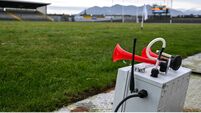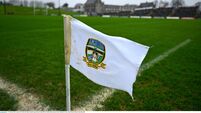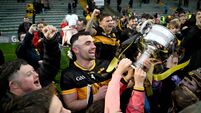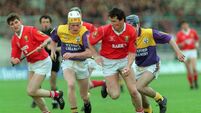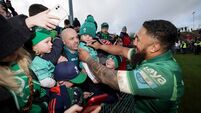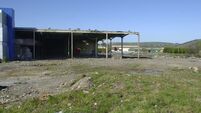Kieran Shannon: Accidental finalists show we now need an FRC for the calendar

FRIENDS REUNITED: The last Division 1 final between Kerry and Mayo was three years ago, a game the Kingdom won 3-19 to 0-13. Pic: INPHO/James Crombie
It is something unique, bordering on special, to have a competition in which more participants are eager to avoid reaching its final than wanting to partake in it.
For almost all of the 21st century, the integrity of the national football league and its top division has been maintained because it has tended to throw up at least one finalist who at the outset of the campaign targeted getting that far.
With Tyrone in 2003 and again with Derry in 2024, Mickey Harte rejected the traditional notion and resisted the usual temptation to play it cute and dismiss the league as only the league; for him a stepping stone to claiming any summer silverware in Croke Park was to get into the habit of going up those steps in the spring.
In the intervening years almost every other serious side and manager adopted a similar approach. Kerry and Jack. Cork under Counihan. Dublin under Gavin. The past two Mayo managers, James Horan and Kevin McStay, announced the start of their last terms by winning the league, wishing to hint more than outwardly declare that this time things would be different, better, greater under them.
This year though Mayo and McStay had no intention of reaching or winning a league final just a week out from another Connacht championship campaign.
And as much as winning leagues has been as much a piseóg of Jack’s than any Páidí imagined, his team these past couple of months were hardly looking to lay waste to everything in their wake the way his team were in 2022 or even Peter Keane’s in 2021 or the Cork hurlers are in 2025.
In 2019 and 2022 both Kerry and Mayo were worthy, even intentional, finalists. This year they are accidental ones.
It is as much a scheduling issue as a structural one. In his first stint with Kerry 21 years ago, O’Connor wasn’t just looking for spring silverware; he was looking for a couple of quality games to kill the time between the end of the league’s round-robin and their first proper test in the championship.
All the better too if those games were played in Croke Park. You could never get enough of that place.
Now almost all has changed. The top teams are well familiar with Croke Park, from playing the Dubs there every second year in the league or their one-and-done season in Division Two or regularly reaching at least the All Ireland quarter-finals.
And there is little to no gap between league and championship. A Dublin or a Kerry or every few years even a Mayo might not mind playing in a league final some time out from the real business of the championship, but when a Mayo might have to play a Roscommon the following week or half your Division 1 teams are only days or weeks from the eve of the Ulster championship, a league final is viewed as more hassle than its worth.
Jim McGuinness last year knew what would be more important and remembered – who won the Division 1 league or who won between Derry and Donegal in the first round of Ulster – and he knows which is more important again this year.
There has been no shortage of suggestions and solutions offered up in recent weeks. Kieran McGeeney has spoken about having a league that’s both home and away. Ciaran Murphy of Second Captains and the Irish Times has pointed out that five league games would be plenty as it is for the hurlers – just break them into Divisions 1A and B, 2A and 2B, and 3A and 3B.
But even that’s piecemeal. Looking at one competition in isolation, just as Congress in February looked at and voted on a new championship format for next season, the sixth different incarnation it will have had in just a decade.
At some stage you can’t just look at what is the best format for the league and what is the best format for the championship. You have to look at what makes the best programme of games for the sport. What makes the best calendar. What makes the best schedule. How it ties in with the club and the hurling and the colleges and whatever else.
The same in hurling. The format of the Munster Championship and thus the championship itself is magical – the best legacy of the short-lived football Super 8s has been how it jolted hurling into adopting a championship format first proposed by this column 15 years earlier – but it still hasn’t figured out how best to utilise the months of February and March.
The Football Review Committee, commissioned by Jarlath Burns and chaired by Jim Gavin, has done sterling work. Whatever about the competitive integrity of this year’s league there has been no doubting its entertainment level because of the interventions, or rather enhancements, of Gavin & Co.
The summer we may not have any proper jeopardy outside of Ulster until late June but at least this time there’ll be some joy to the fare we’ll watch.
The FRC’s various predecessors had plenty of scope only to focus whatever they thought was most pressing at the time. The class of 1999 featuring Colm O’Rourke and others focused on how the sport was formatted, resulting in the death of the old do-or-die championship and the advent of the qualifiers.
A decade later the late great Eugene McGee and his merry men zoned in how the game was played between the lines, resulting in the advent of the black card, an intervention that undoubtedly considerably cleaned up the sport. They could have recommended changes to how the league or championship was formatted but felt they had enough on their plate trying to eradicate Cavanagh-on-McManus style tackles.
A decade on such was the dire state of the game that Burns had one simple directive for Gavin and his group: save our game and if you can make it the best it or any other game can be.
They have no remit and possibly no desire to look at the footballing and GAA calendar.
But someone should. After first taking the Manhattan that is the state of football, Burns should channel his inner Cohen and then look to take the Berlin that is the calendar and our competition structures and programme of games. Chaired by Gavin, or if the man feels he has already done the state some and enough service, someone of his ilk with his scope and methodology and support.

